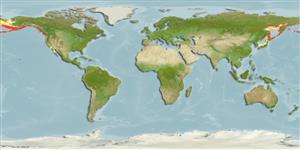分類 / Names
俗名 | 同種異名 | Catalog of Fishes(屬, 種) | ITIS | CoL | WoRMS | Cloffa
Teleostei >
Salmoniformes (Salmons)
鮭形目 (Salmons) >
Salmonidae (Salmonids)
鮭科 (Salmonids) > Salmoninae
Etymology: Oncorhynchus: Greek, onyx, -ychos = nail + Greek, rhyngchos = snout (Ref. 45335).
More on author: Walbaum.
Environment: milieu / climate zone / depth range / distribution range
生態學
海洋; 淡水; 半鹹淡水 底中水層性; 溯河洄游 (Ref. 51243); 深度上下限 0 - 250 m (Ref. 50550), usually ? - 61 m (Ref. 96339). 極; 0°C - 24°C (Ref. 35682); 67°N - 24°N, 130°E - 110°W (Ref. 117423)
North Pacific: Korea , Japan, Okhotsk and Bering Sea (Ref. 1998), Arctic Alaska south to San Diego, California, USA. Asia: Iran (Ref. 39702).
北太平洋: 韓國 (參考文獻 1998) ,日本, 鄂霍次克海與白令海 (參考文獻 1998), 阿拉斯加州北極圈南至聖地牙哥,美國加州。 進口在德國限制 (Anl。 3 BArtSchV). 亞洲: 伊朗.(參考文獻 39702)
Length at first maturity / 大小 / 重量 / 年齡
Maturity: Lm 70.0 range ? - ? cm
Max length : 100.0 cm FL 雄魚/尚未辨別雌雄; (Ref. 559); common length : 58.0 cm TL 雄魚/尚未辨別雌雄; (Ref. 3561); 最大體重: 15.9 kg (Ref. 40637); 最大年齡: 7 年 (Ref. 1998)
背棘 (總數) : 0; 背的軟條 (總數) : 10 - 14; 臀棘: 0; 臀鰭軟條: 13 - 17; 脊椎骨: 59 - 71. Distinguished by the lack of distinct black spots on the back and tail and by the presence of 18 to 28 short, stout, smooth gill rakers on the first arch (Ref. 27547). Pelvic fins with axillary process; caudal truncate to slightly emarginate (Ref. 27547). Large individuals are steel-blue dorsally, with speckles of black; silver on the sides; silvery to white ventrally. Males have tinges of black on the tips of its caudal, anal and pectoral fins. Spawning males are dark olive to black dorsally; grey-red with green vertical bars on the sides; dark grey ventrally; anal and pelvic fins with white tips. Spawning females resemble spawning males but less distinctly marked.
區別的特徵為在背部與尾部上的缺乏明顯的黑色斑點而且藉由在第一個弓上有 18 到 28個短的﹐矮胖的﹐和平滑的鰓耙.(參考文獻 27547) 腹鰭有腋窩的羽翼突起; 尾部的截形到邊緣微凹.(參考文獻 27547) 大的個體是鐵-藍色背面, 藉由黑色的小的斑點; 銀色的側邊上; 銀色到腹側白色的。 在它的尾鰭、臀鰭與胸鰭的頂端上雄魚有黑色的淡色。 生育期的雄魚是黑的橄欖色到黑色的背面; 灰色的-側邊上紅色的有綠色的縱帶; 深灰色的腹地; 臀鰭與腹鰭鰭有白色的頂端。 產卵雌性與生育期的雄魚相似但是更不極顯著的。
Inhabits ocean and coastal streams (Ref. 86798). Migrating fry form schools in estuaries, remain close to shore for a few months and finally disperse to enter the sea (Ref. 1998). Epipelagic (Ref. 58426). Juveniles and adults feed mainly on copepods, tunicates and euphausiids but also on pteropods, squid and small fishes (Ref. 1998). Adults cease feeding in freshwater (Ref. 1998). Males and females die after spawning. The catch is mostly canned but also sold fresh, dried-salted, smoked, and frozen. Eaten steamed, fried, broiled, boiled, microwaved, and baked (Ref. 9988). Utilized for caviar.
棲息於海洋與海岸的溪流。 迴游魚苗在河口形成魚群, 保持接近海岸數個月而且最後分散進入海洋.(參考文獻 1998) 表層帶.(參考文獻 58426) 稚魚與成魚主要捕食橈腳類的動物, 被囊類,而且磷蝦也捕食翼足目的軟體動物,烏賊與小魚。 (參考文獻 1998) 成魚停止覓食於淡水。 (參考文獻 1998) 雄性與雌性在產卵之後死亡。 捕捉大部份被裝於罐頭也賣.生鮮地, 乾燥鹽醃,煙燻., 與冷凍。 清蒸,油炸,火烤, 煮沸, 微波., 而且燒烤..(參考文獻 9988) 用來做魚子醬.。 這種的阿拉斯加州鮭魚漁場已經被檢定藉由海洋的總管職務會議 (http://www.msc.org/) 當管理良好且族群能維持。
Life cycle and mating behavior
成熟度 | 繁殖 | 產卵場 | 卵 | 孕卵數 | 仔魚
Enters freshwater during advanced stage of sexual development and spawning occurs almost immediately (Ref. 1998). Spawning occurs at depths of ~3 meters, current speeds of ~20cm/sec. near the head waters over sand and pebbles at 4-11° C water temperature. At spawning time the female excavates a hole of around 1 meter diameter and 50 cm depth before spawning can occur (Ref. 12218). Nest building is done by the female by lying on one side and lashing its tail to displace the sand and silt on the river bed. The pair then settles in the nest, mouths gape, and with rapid vibration of the pair, eggs and milt are released. The female then covers the nest. Males are aggressive and may spawn with different females; females likewise may spawn with other males and therefore builds different nests. Adults die after a week (Ref. 1998). A fish spawns 700-7,000 eggs in two to three egg releases. Eggs are ~300-3,500 per spawn. Egg size is ~6.7 mm, water temp. is 8-10°C at 60 days before hatching. Larva size is around 16 mm. Come springtime the juveniles go to the ocean and come back 3-4 years later to their exact birthplace. This fish reaches maturity in 2-4 years. Larvae are found around the spawning site, Juveniles are found around the coast. Juveniles migrate to the ocean at ~27-45 mm during February at water temperatures around 4° C (Ref. 12218).
Reproductive strategy: synchronous ovarian organization, determinate fecundity (Ref. 51846).北太平洋: 韓國 (參考文獻 1998) ,日本, 鄂霍次克海與白令海 (參考文獻 1998), 阿拉斯加州北極圈南至聖地牙哥,美國加州。 進口在德國限制 (Anl。 3 BArtSchV). 亞洲: 伊朗.(參考文獻 39702)
Page, L.M. and B.M. Burr, 2011. A field guide to freshwater fishes of North America north of Mexico. Boston : Houghton Mifflin Harcourt, 663p. (Ref. 86798)
IUCN 瀕危狀態 (Ref. 130435: Version 2024-1)
人類使用
漁業: 高經濟性; 養殖: 商業性; 游釣魚種: 是的; 水族館: 公眾的水族館
工具
特別的報告
下載 XML
網路資源
Estimates based on models
Preferred temperature (Ref.
123201): 1.1 - 8.3, mean 3.3 °C (based on 192 cells).
Phylogenetic diversity index (Ref.
82804): PD
50 = 0.5000 [Uniqueness, from 0.5 = low to 2.0 = high].
Bayesian length-weight: a=0.01445 (0.00751 - 0.02781), b=3.10 (2.94 - 3.26), in cm total length, based on LWR estimates for this species & Genus-body shape (Ref.
93245).
營養階層 (Ref.
69278): 3.7 ±0.2 se; based on diet studies.
回復力 (Ref.
120179): 中等的, 族群倍增時間最少 1.4 - 4.4年 (K=0.27-0.45; tm=2-5; tmax=6).
Prior r = 0.32, 95% CL = 0.21 - 0.48, Based on 8 full stock assessments.
Fishing Vulnerability (Ref.
59153): Moderate to high vulnerability (49 of 100).
Climate Vulnerability (Ref.
125649): High to very high vulnerability (71 of 100).
Nutrients (Ref.
124155): Calcium = 15.6 [4.4, 41.3] mg/100g; Iron = 0.337 [0.168, 0.758] mg/100g; Protein = 18.4 [17.2, 19.5] %; Omega3 = 1.71 [0.78, 3.77] g/100g; Selenium = 110 [32, 369] μg/100g; VitaminA = 13.3 [4.6, 41.2] μg/100g; Zinc = 0.424 [0.266, 0.821] mg/100g (wet weight);
